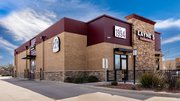Article
Good traffic, but less spending expected in slowing economy
Every segment of the restaurant industry will feel the impact of reduced spending, but experts believe that the quick-service segment will suffer the least for a variety of reasons.

November 6, 2005
Still, that doesn't ensure every restaurant will be busy all the time, especially given current concerns over inflation and the expected consequence: a reduction in non-essential consumer spending.
somewhat gloomy economic forecast will impact the restaurant industry was the question posed by Buckingham Research restaurant stock analyst Mark Kalinowski to industry watcher John Hamburger, president of Franchise Times Corp.
Like many of his ilk, Hamburger sees the negative effects of this year's Gulf Coast hurricanes having a cooling effect on the still-hot American economy. Higher costs for gas have customers driving their cars less and cutting back some on restaurant visits. And as winter works its way south, the cost of heating American homes will move sharply north. That, he said, will force restaurant patrons to consider much more carefully how they'll spend their discretionary dollars.
"There is no question that high gasoline prices will continue to impact the restaurant industry," Hamburger said. Americans will endure "sticker shock" when they open their utility bills this winter, and those increases will pinch disposable income significantly, he said. "I am not very optimistic about (the fourth) quarter and the first quarter of 2006, because I can see a scenario where cutbacks will have to be made in many American households to make (utility) payments."
Casual dining will be tenseEvery segment of the restaurant industry will feel the impact of reduced spending, but Hamburger believes not all will be affected equally. Casual dining restaurants will continue to enjoy steady traffic, but he expects their patrons to spend less per transaction, a behavior he called "trading down." Another "area which a consumer can reduce their household expenditures immediately would be to scale back those restaurants where tipping is a part of the service." As a result, he said to expect casual concepts that provide curbside service to market that option aggressively.
As it typically does when discretionary dollars dry up, fine dining will take a hit. Though businesses may continue entertaining clients at pricey eateries, he said the "traditional customer will likely change his purchase mix and reduce his attendance at the higher-check average concepts."
Hamburger expects the quick-service segment to suffer the least because of its appealing menu upgrades across many concepts and its well-established value position. And since fewer people than ever bring lunch to work, the stranglehold QSRs have on that daypart will remain their strong suit.
But while QSR operations will continue to draw customers, operating margins will face incredible pressure from increases in food and utilities costs. Many Rising interest rates that drive up home mortgage costs are not good for the restaurant industry. — John Hamburger, President, Franchise Times
Good traffic, tight marginseconomists have avoided calling this trend "inflation," but Hamburger didn't. He's also concerned that operators will lose customers if they raise prices.
"I am not optimistic that restaurant companies will be able to pass on higher costs to consumers, especially over the next year," he said. Inflation is challenging any time, but "especially when the consumer is in a value-conscious mode."
Financial experts have said for the last few years that consumers' access to cheap money would come back to haunt them. But despite that warning, credit-card spending has increased unabated, and many consumers used once-inexpensive home equity loans to pay down those card balances. As the prime lending rate has increased, so has the interest charged on home equity lines. The result, Hamburger said, will be fewer non-essential purchases because consumers will become increasingly reluctant to borrow.
"One driver of retail and restaurant activity has been the home refinancing boom, (but) cash-out refinancing has slowed considerably with the higher mortgage rates," he said. "Rising interest rates that drive up home mortgage costs are not good for the restaurant industry."
Hurricanes: double trouble for independentsIf Katrina's and Rita's damage to the nation's economy hasn't been enough, the future will be doubly challenging for independent restaurant operators attempting to rebuild in areas damaged by those storms, Hamburger warned.
"I actually believe Katrina should be bullish for chain restaurants and franchises that have operations in those areas, because most chain restaurants and their franchises have the wherewithal to rebuild," he said. "Many independent restaurants in these markets will not rebuild, which will make it easier on the chains to get customers."
 ChatGPT
ChatGPT Grok
Grok Perplexity
Perplexity Claude
Claude








